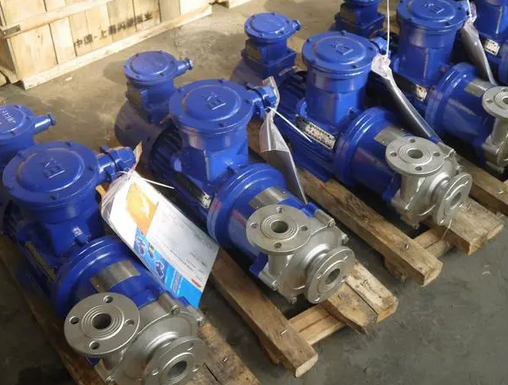Magnetic materials for magnetic pumps
The magnetic material in the magnetic pump is the key component to achieve leakage-free and contactless transmission. At present, the magnetic materials commonly used in magnetic pumps are mainly the following:
I. Rare earth permanent magnet materials
1. Neodymium iron boron (Nd-Fe-B)
Features: Neodymium iron boron is the most widely used and strongest rare earth permanent magnet material. Its maximum magnetic energy product is as high as 28X10^4T·A/M, and its intrinsic coercive force exceeds 1120KA/M.
Application: Due to its excellent magnetic properties, neodymium iron boron has been widely used in magnetic pumps, especially in occasions requiring high magnetic energy product and strong magnetic force.
2. Other rare earth permanent magnet materials
In addition to neodymium iron boron, other rare earth permanent magnet materials such as diamond permanent magnet materials (such as SM (CO, CU, FE, ZR) 7.4, referred to as 2:17) are also used in magnetic pumps. Although the magnetic properties of these materials are slightly inferior to those of neodymium iron boron, they have better stability under certain specific conditions (such as high temperature environment).
3. Ferrite
Features: Ferrite is a traditional permanent magnetic material with the advantages of low cost and simple preparation process. However, its magnetic properties are relatively weak and suitable for occasions where magnetic properties are not required.
Application: In magnetic pumps, ferrite is often used as an auxiliary magnetic material or in some products with high cost requirements.

4. Other materials
With the development of materials science, some new magnetic materials (such as nano-composite permanent magnetic materials, etc.) have also been gradually studied and applied to magnetic pumps. These materials may have better magnetic properties or special functionality (such as high temperature resistance, corrosion resistance, etc.).
5. Material selection and considerations
When selecting magnetic materials for magnetic pumps, the following factors need to be considered comprehensively:
Magnetic properties: including performance indicators such as maximum magnetic energy product and intrinsic coercive force to meet the magnetic pump's demand for magnetic force.
Stability: including temperature stability, chemical stability, etc., to ensure that the magnetic pump can operate stably under different working conditions.
Cost: Under the premise of meeting performance requirements, reduce material costs as much as possible to improve product competitiveness.
Processing performance: Consider the impact of material processing difficulty and cost on production efficiency and product quality.
In summary, there are many kinds of magnetic materials in magnetic pumps, and each material has its own unique advantages and scope of application. When choosing, it is necessary to make comprehensive considerations based on specific application scenarios and needs.




